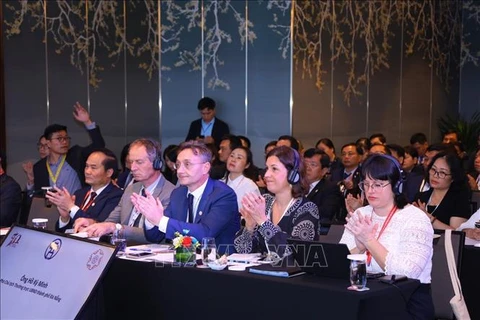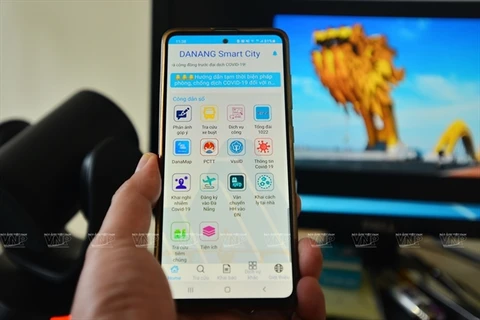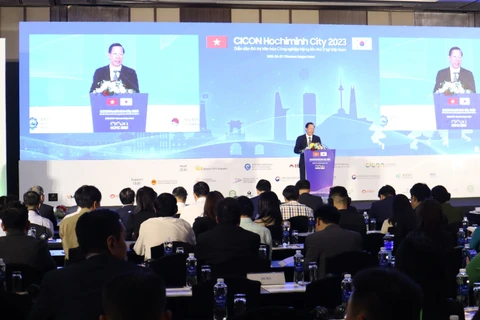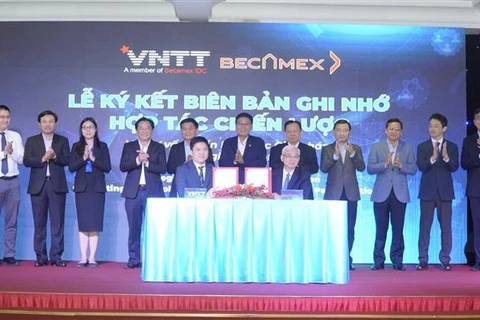Hanoi (VNS/VNA) - While more than 40 cities and provinces across the country have smart city operation centres, many experts believe that urban development progress still falls short of expectations and call for better training programmes for future management.
According to Dr Luu Duc Minh, deputy director of the Academy of Managers for Construction & Cities (AMC), the goal of smart city development is not how many criteria are met, but to increase the quality of life for the people.
“The core nature of sustainable cities, according to the Politburo’s Resolution 06, is development aligning with green growth and climate change response.
“Therefore, for cities to be ‘smart’, management at all levels need to have the right perspective and the existing urban issues need to be addressed,” said Minh.
Politburo Resolution No 06-NQ/TW on planning, construction, management and sustainable development of urban areas in Vietnam to 2030, with a vision to 2045, was issued on January 24, 2022.
Citing examples, Minh said that urbanisation required solutions for a city’s current shortcomings, such as housing, planning, water drainage, traffic or waste treatment.
Measures needed to be taken alongside proper and comprehensive investment and construction, which would help improve the quality of the urban areas as well as people’s life quality, he said.
The AMC, which is under the Ministry of Construction (MoC), has been coordinating with other departments to form a professional centre that will promote research and training on smart cities and advanced construction technology.
This is part of a cooperation project between Vietnam and the Republic of Korea (RoK) which the MoC expects to realise the Party direction and policies in developing sustainable smart cities by 2030.
The four key aspects AMC are focusing its training programmes on are the overview of smart city and its development management, Party direction and the State laws on building and developing smart cities, smart city standards and indexes, and the components of smart city development.
These training programmes are targeted at public officers, who will then provide consultancy to their respective locality on its smart city development project.
Dr Luu Duc Hai, director of the Institute for Urban Studies and Infrastructure Development, who also led the MoC’s Urban Development Agency, said that it was inevitable to build smart cities.
Therefore, training programmes in this sector needed to focus on sustainable development and smart cities.
Meanwhile, Dr Nguyen Hong Tien, former head of the Urban Infrastructure Agency, added that these programmes needed improvement to be more concentrated and re-categorised into groups such as smart city database, planning and operations.
He added that the curriculum should also specify the steps to be achieved in building a smart city, allowing learners to understand what should be done in the city’s course of development.
Sharing the same perspectives, Bach Minh Tuan, deputy director of the MoC’s Information Centre, agreed that the subjects taught needed to be arranged in order of priority, with smart city criteria included right in the planning process for optimal results.
Dr Vu Anh, a lecturer from Hanoi Architectural University, added that training programmes needed to identify human resources and capital among its investment sources.
“Training programmes should utilise multiple tools in smart city development.
“Resolution No 06-NQ/TW will be a key guideline throughout to develop sustainable smart city programmes,” said Vu Anh./.
According to Dr Luu Duc Minh, deputy director of the Academy of Managers for Construction & Cities (AMC), the goal of smart city development is not how many criteria are met, but to increase the quality of life for the people.
“The core nature of sustainable cities, according to the Politburo’s Resolution 06, is development aligning with green growth and climate change response.
“Therefore, for cities to be ‘smart’, management at all levels need to have the right perspective and the existing urban issues need to be addressed,” said Minh.
Politburo Resolution No 06-NQ/TW on planning, construction, management and sustainable development of urban areas in Vietnam to 2030, with a vision to 2045, was issued on January 24, 2022.
Citing examples, Minh said that urbanisation required solutions for a city’s current shortcomings, such as housing, planning, water drainage, traffic or waste treatment.
Measures needed to be taken alongside proper and comprehensive investment and construction, which would help improve the quality of the urban areas as well as people’s life quality, he said.
The AMC, which is under the Ministry of Construction (MoC), has been coordinating with other departments to form a professional centre that will promote research and training on smart cities and advanced construction technology.
This is part of a cooperation project between Vietnam and the Republic of Korea (RoK) which the MoC expects to realise the Party direction and policies in developing sustainable smart cities by 2030.
The four key aspects AMC are focusing its training programmes on are the overview of smart city and its development management, Party direction and the State laws on building and developing smart cities, smart city standards and indexes, and the components of smart city development.
These training programmes are targeted at public officers, who will then provide consultancy to their respective locality on its smart city development project.
Dr Luu Duc Hai, director of the Institute for Urban Studies and Infrastructure Development, who also led the MoC’s Urban Development Agency, said that it was inevitable to build smart cities.
Therefore, training programmes in this sector needed to focus on sustainable development and smart cities.
Meanwhile, Dr Nguyen Hong Tien, former head of the Urban Infrastructure Agency, added that these programmes needed improvement to be more concentrated and re-categorised into groups such as smart city database, planning and operations.
He added that the curriculum should also specify the steps to be achieved in building a smart city, allowing learners to understand what should be done in the city’s course of development.
Sharing the same perspectives, Bach Minh Tuan, deputy director of the MoC’s Information Centre, agreed that the subjects taught needed to be arranged in order of priority, with smart city criteria included right in the planning process for optimal results.
Dr Vu Anh, a lecturer from Hanoi Architectural University, added that training programmes needed to identify human resources and capital among its investment sources.
“Training programmes should utilise multiple tools in smart city development.
“Resolution No 06-NQ/TW will be a key guideline throughout to develop sustainable smart city programmes,” said Vu Anh./.
VNA

























